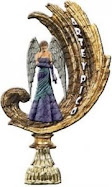This post includes another entry about my father's stroke, an ongoing series I started on June 8th. Quit at the asterisks if you just want the gardening news.
Several days ago, my friend Sarah and I made the rounds of my garden, noting especially all the unprecedented molds and fungi that have sprung up. Sarah is the silver lining to the cloud that was the Bozeman Home and Garden Show last March; she's the person who came to check out the solar-panel possibilities of our shady lot, and while I haven't decided to spring for twenty-thousand dollars worth of panels, I have gained a new gardening friend–one who knows her mushrooms.
This has appeared in one of the plots on the alley:
And these charmers appeared by boards near the compost pile next door:
And then, the featured item, from the fairy ring in the back yard:
Sarah informed me that true fairy ring mushrooms—Marasmius oreades—are edible. And here they've been in the back yard all along! I feel a bit like Molière's bourgeois gentleman (The Middle-Class Gentleman), who, upon being introduced to the distinction between prose and poetry, was delighted to realize that he had been speaking prose all his life.
Time, however, for the requisite warning: over 50 varieties of mushrooms can form fairy rings, and some of these are quite poisonous. So go slow!
Marasmius oreades only grow to be one to two inches in diameter, with slender, unusually tough, fibrous stems. The caps, bell-shaped when young, lift and flare out as they mature, becoming almost flat save for a central depression from which rises a characteristic bump resembling the pom-pom on a tam o'shanter. That bump gives these mushrooms their second folk name, “Scotch Bonnets.” I have utterly failed to show that bump in my photo, and my camera is, er, non-operational at the moment (where is that battery charger? I knew I should have a back-up battery!) so I can't correct the omission. Dang.
These mushrooms are named for one of their more unusual characteristics. In his book Edible Mushrooms, Clyde Martin Christenson explains: “Marasmiu means withered or shriveled, and the name was applied to this genus because, unlike most mushrooms, these plants wither in dry weather but do not die; when moistened they revive, regain their original size and shape an freshness, and continue to shed spores.”
Fortunately for the mushroom collector, this means that Marasmius oreades are equally easy to dry and to re-constitute in the kitchen (They will not, however, continue to shed spores.) I poured a little hot water over some quite shrunken specimens and they plumped up within a minute.
But—and here is the critical question—how do they taste?
I decided to find out on Sunday morning, and assembled omelette ingredients: chives, spinach, chopped stems from the spinach and some kale, and of course the mushrooms. (There's also stray strawberry that had gotten knocked off its plant by hail.)
Some mushrooms that I picked dry appear in the middle of the photo.
Here's there's a close-up of these, along with the ones that I reconstituted:
Before I poured hot water over them, the plump ones looked just like that sad pair on the right.
But back to the question of taste.
Tom Volks, a University of Wisconsin mycologist who featured Marasmius oreades as his 75th fungus of the month back in 2003, doesn't think much of their culinary qualities. However, I agree with Christensen, who calls them “Edible and Delectible." Briefly sauteed in butter, they gave to the omelette a light, pleasing flavor. Granted, my mushroom hunting career is confined to this one incident, but I could not be happier.
And for the even more critical question: did I (or Sarah) correctly identify them? Are they actually safe? Well, it's now two days later, and I'm not dead yet.
* * * * * *
The Back story II: the fall
On November 23, 2009, my parents were headed home from some excursion. As navigator, Connie was in front, and by the time she realized that Dad wasn't behind her and got back to him, passers-by had pulled him off the street and had phoned for help. Again and again, she speaks of the kindness of these strangers.
Miraculously, Dad wasn't otherwise injured when he fell, which seems almost grimly ironic: all involved—family, doctors, caretakers—are gradually reaching the consensus that his dementia is probably caused not by Alzheimer's, but by the many bad hits to the head he's taken, several knocking him unconscious and most incurred while cycling.
I only remember one of these, the others having taken place after I left the house. One day in September of 1969, he set off on his bike as usual for the University, where he was a math professor. (He used to tell me to write "math teacher" on forms that asked my father's profession.) He'd just turned forty-three, he was father of three (obstreperous) teenage daughters, there was gray in his beard, and he was feeling depressingly middle-aged. At forty-three, after all, one was really in one's mid-forties, truly over the hill.
On that day he was wearing, as usual, hiking boots, corduroy pants, and a red-and-black checked wool shirt. No helmet; it was still the sixties, and who wore helmets? Not far from home he went sailing over the hood of a car that cut him off. While he was still unconscious, the police, eschewing the hard facts his wallet would have revealed, estimated his age at twenty-eight. As he told it, chuckling, that made up for the whole experience. (Connie prefers his first line when he regained consciousness: "Excuse me, but where am I?")
The stroke—or is it the dementia? Who can tell, and what does it matter?—has left him speechless, incontinent, and deeply depressed. His right hand is oddly clenched, with the thumb pushing against the first finger so hard that both are becoming calloused. This makes the simplest actions—buttoning shirts, eating—laborious, even impossible. Of course he is right-handed.
The stroke hit eleven days after my first knee surgery. I know; first? I've only mentioned one here in the blog. Actually I had both knees replaced, one in mid-November and one six weeks later at the very tail end of the year. Sneaking it in under the insurance wire, you know.
Why didn't I mention the second one? Partly because I hadn't even found a way to write about my father's stroke, a much more important event, so how could I write about my silly knees?
But these surgeries turned out to be a bigger deal than I'd anticipated. In this era when women having Caesarian sections have had to fight for hospital stays lasting more than twenty-four hours (“Take your stitches, your baby, and go home. Hey, you'll be fine!”) I was kept for three nights. And guess what? No flying for three months, for fear of blood clots. I've had over a dozen surgeries, and have never had such restrictions.
I and my older sister, who's completely tied down by work, took turns talking with our mother every night after the stroke and then phoning each other, trying to understand Dad's condition, the hospital and rehab routines, the whole Canadian health-care system, from afar. And from afar, we pooled sympathy and comfort.
But our mother had to cope on her own. How she managed, I don't know, but she did, through six weeks of hospital and rehab, during which she underwent daily commutes of an hour or more each way, commutes during which she was too stressed to read. Then, after the rehab unit released him on Christmas Eve, having decided that they couldn't help him, Con cared for Dad at home for two months. (She shrugs—a graceful move, when she does it—and says, “You do what's necessary.”) She did hire nurse's aids to change him during the night, so she could get some rest, but she still wasn't able to sleep well. Perhaps out of some weird, useless sympathy, neither could I.
Sometime in February (Connie, not surprisingly, knows the exact date: Feb. 26) a room opened up in the long-term care section of the retirement home where my parents have an apartment. He's there now, and that's where I would see him when I went to visit in May.

 Subscribe to RSS feed
Subscribe to RSS feed



I have just recently discovered your wonderful blog, and want to simply tell you how much your writing touches and inspires me. I wish for you, your parents, and all of your family as much comfort as can be found in a terribly difficult time.
Thank you, Plantanista. It’s taken me too long to say so, but I do appreciate this.
–Kate